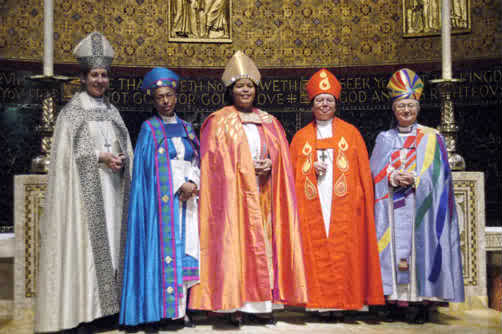 |
The divine Spirit-driven power of the Word is illustrated by the rain and snow.
1. The Word always has an effect.
2. The Word always accomplishes God's purpose.
3. The Word always prospers God's will.
Do we need more broadcasting of the Word or more man-made methods?
The synods vote - "Methods. Yay us." |
Our helper messaged me about the next job, "Are we pulling maples?" We have hundreds of maple trees growing in the front and backyard. Almost Eden called it a "maple tree farm," even though I have been yanking maples up since they sprouted in the early spring.
I was out of mulch so we began pulling maples in the shade of the house, where the rose garden first began with eight holes in the lawn. Grandson Alex carefully photographed them and Sassy sniffed them in her role as guard dog. Approved.
I planted the TV offer of eight bare root roses for $64. I am not seeing any bargains like that this year, nor has Gurney's offered me $5 roses. The recession is ending as optimism increases.
Next came the eight KnockOut roses. Instead of making and hauling compost or rototilling the soil, I dug holes, planted roses, and mulched afterwards, turning the lawn into compost on the spot. Instant composting meant that I kept the soil creatures and increased their food and moisture by shutting out the sunlight and providing an edible blanket of newspaper, cardboard, and wood mulch.
The first shipment of $5 roses (ten in all) - via Gurney's from Week's Rose - ended as the Maple Tree Rose Garden.
Our helper joked about all the work we have put into the front yard, which is now attracting visitors, as it should. Mulch, newspapers, and cardboard rot into the soil, improving it, and weeds spring up from below or land on top from the wind or the bombardment of birds. All it takes is steady maintenance.
As I wrote before, having a helper is especially worthwhile because pulling up weeds is tedious but necessary. Roses do not want grass or weeds within two-three feet of their canes. They stay alive when crowded but do not thrive and cannot show off as they might.
 |
A bumble bee was on a rose I wanted to cut for the vase.
He moved away without bothering me. |
The Big Rain
The big rain last night filled the rain-barrels again and helped everything in the gardens that I was trying to do.
Gardeners and dreamers of gardening - If you had barrels and paint-buckets of free liquid, harmless but effective fertilizer, would you use it abundantly, knowing that even more was coming in a few days?
I think so.
That is why we live-stream the Means of Grace without log-ins, passwords, and secret codes. Some are offended that we reach so many around the world.
People write to ask why I often blog at midnight and again a few hours later. The reason - I know the Word will accomplish something. The Word cannot fail in being effective. I know from getting dozens of raging comments attacking everything worthwhile but wrapped in the most sanctimonious language.
But even better, people write personal (signed) emails expressing thanks for a place where they can see doctrine and church politics explained, with an emphasis on doctrine, including the "boring and irrelevant" Book of Concord.
 |
| Calladiums are great in the shade. |
The Welcome Surprises of Gardening
I pointed to the Mountain Mint that burst through its funeral pall of newspapers and mulch. "Here's my favorite plant that you tried to bury alive." Our helper said, "I know. I saw it." I added, "Don't worry. I just pulled up one of my new plants, thinking it was a weed." Our helper, "Put it back."
We laugh about mistakes, stepping on plants, and doing the wrong thing, because that is bound to happen as we stumble through God's Creation. The good plants often return in their glory, as some roses have done.
Calladiums are showing off their color in the shade, after being planted last fall. If a good crop comes up, they will beautify the Maple Tree Rose Garden. If not, the vendor will send me a new batch, even if weather was the fault.
Elephant Ears are showing promise after breaching the surface. They quickly became the largest leaves in the garden and threaten to attain their full size in time.
Big fat tomatoes are growing on mature plants while new plants grow and bloom.
One large Bee Balm created such beautiful flowers that one lady asked if she could have a cutting so she could enjoy the same plant in her yard. She loved the Vicks Vapo-rub aroma too. I thought she would say, "Get that stink away from the roses in the vase," but she loved the combination of colors.
 |
| My purple Bee Balm bush is shoulder high. |







































